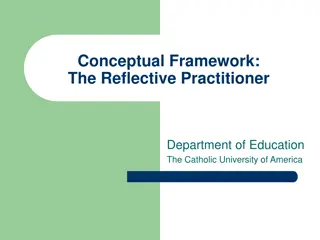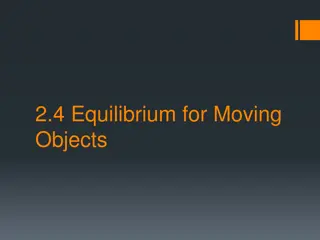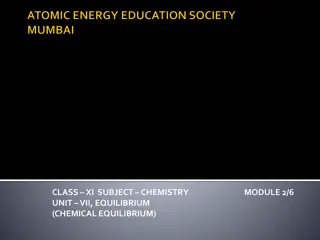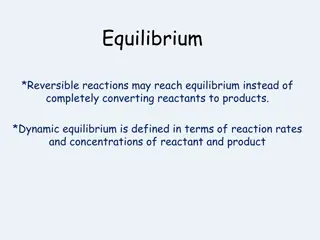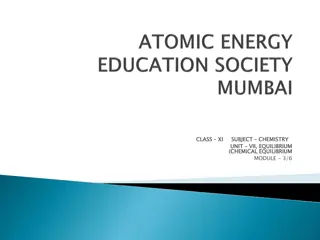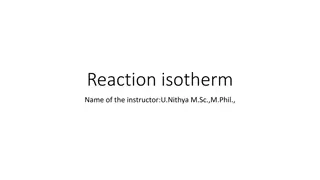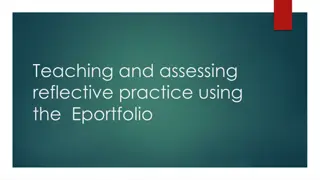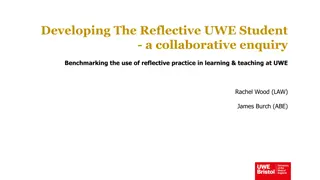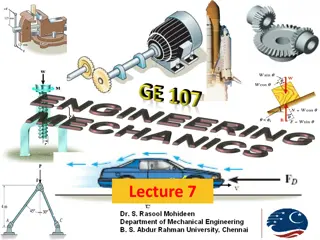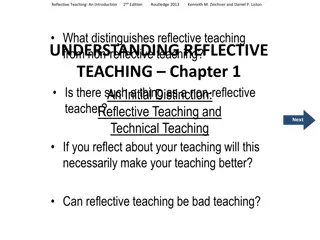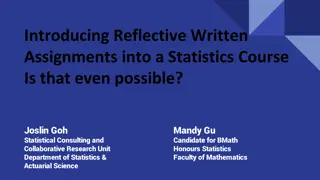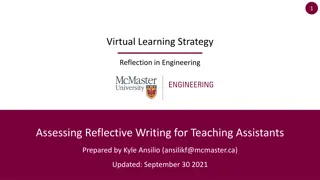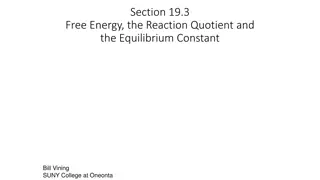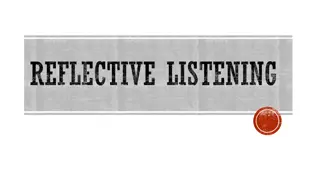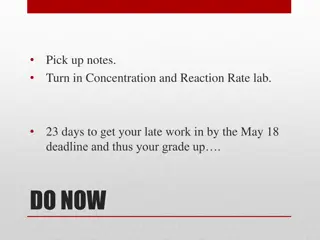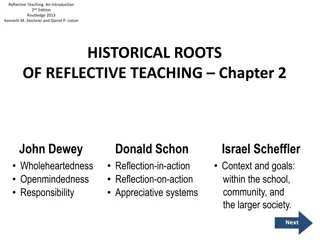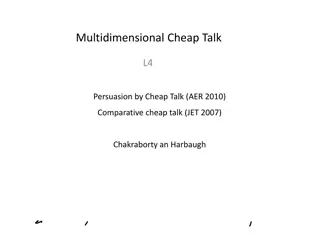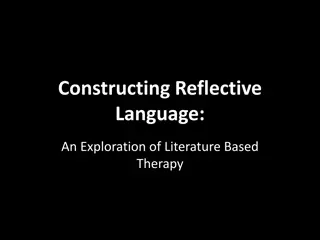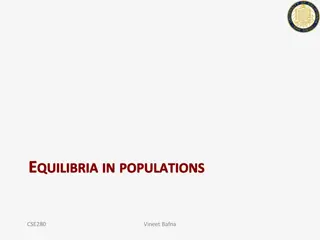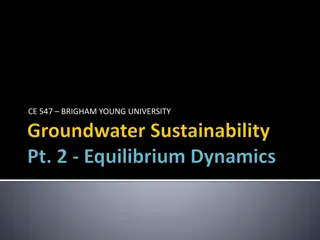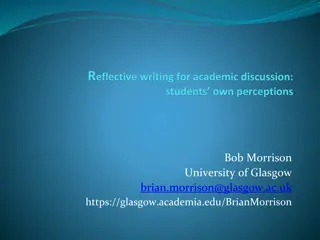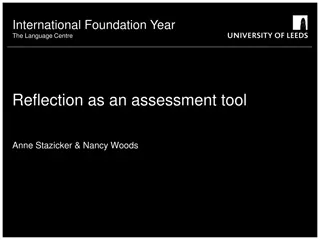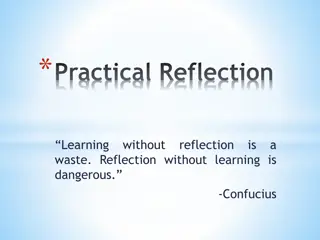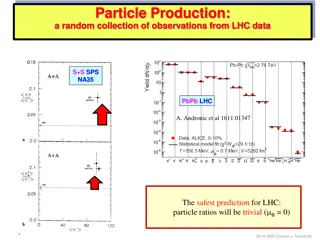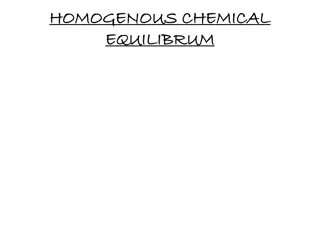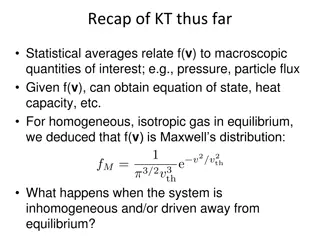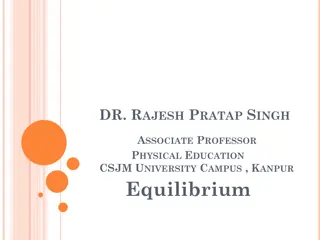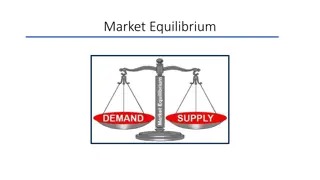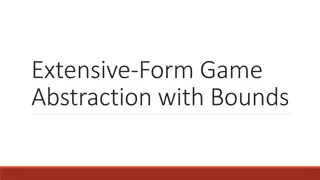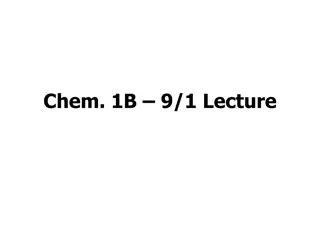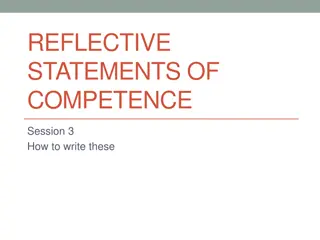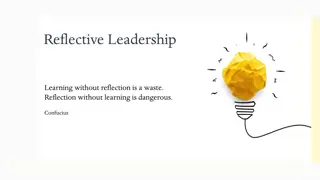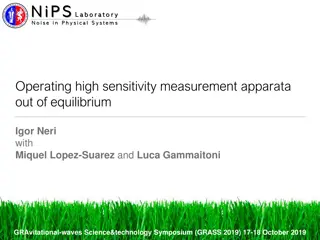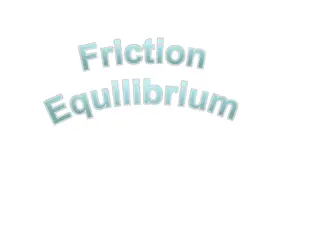Personal Reflective Writing Through Two Engaging Passages
Personal reflective writing involves exploring your reactions to events or experiences, delving into your thoughts and emotions to provide a unique perspective. This form of writing goes beyond mere storytelling and requires genuine reflection and introspection to create engaging and authentic narra
0 views • 39 slides
Reflective Practice in Education: A Conceptual Framework
Delve into the concept of reflective practice within the field of education through the reflective practitioner framework at The Catholic University of America's Department of Education. Understand how reflective practitioners consider the consequences of educational decisions for constant refinemen
1 views • 30 slides
Enhancing Professional Practice through Reflective Practice
Reflective practice is an essential ongoing process in professional practice with children and families. It involves honest, deep, and critical thinking to improve outcomes, challenge assumptions, and seek collaboration. Through reflective practice, educators can recognize good practices, address ch
0 views • 35 slides
Equilibrium for Moving Objects
Objects can be in static equilibrium when at rest or dynamic equilibrium when moving at a constant speed. Equilibrium is maintained when there is no net force to change the state of motion. This equilibrium is possible when forces either cancel out or there is no force acting on the object. Friction
0 views • 8 slides
Chemical Equilibrium in Reversible Reactions and Laws
Chemical equilibrium in reversible reactions involves the balance between forward and backward reactions, as governed by laws like the law of mass action and the law of chemical equilibrium. These laws help in understanding the rates of reactions, equilibrium constants, and the relationship between
1 views • 12 slides
Dynamic Equilibrium in Chemical Reactions
Explanation of reversible reactions, dynamic equilibrium, and the characteristics of equilibrium in chemical systems. Covers the concept of reversible reactions, dynamic equilibrium, rules for dynamic equilibrium, and examples to illustrate these concepts visually.
0 views • 54 slides
Le Chatelier's Principle in Chemical Equilibrium
Le Chatelier's Principle states that when a system at equilibrium is disturbed by changes in concentration, temperature, or pressure, the equilibrium shifts to counteract the change. This principle can be applied to predict the direction of equilibrium when changes occur. Changes in concentration, p
0 views • 10 slides
Reaction Isotherms and Equilibrium Constants
Explore reaction isotherms and equilibrium constants through Vant Hoff's and Gibbs free energy equations. Learn about the relationship between Gibbs free energy, equilibrium constant, and temperature dependence. Discover how these concepts are applied in determining the direction of chemical reactio
2 views • 18 slides
Enhancing Reflective Practice Using Eportfolios
Reflective practice is a metacognitive process crucial for self-understanding and future action. Utilizing Eportfolios in teaching and assessing reflection helps trainees develop critical thinking skills. The session plan includes discussion on educator comments, exploring Eportfolios, and strategie
0 views • 16 slides
Reflective Practice in Learning & Teaching at UWE
The collaborative enquiry at UWE delves into the use of reflective practice in various professional courses, highlighting challenges and the importance of reflective capacity. A diverse group engages in iterative cycles of input, conversation, reflection, and refreshments to benchmark and enhance re
0 views • 15 slides
Equilibrium of Rigid Bodies: Moments, Couples, and Forces
The topic covers the equilibrium of rigid bodies with a focus on moments, couples, and forces. It discusses concepts such as moments of a force, Varignon's theorem, types of supports, and equilibrium in two and three dimensions. The equilibrium in two-force members and three-force members is explain
0 views • 23 slides
Understanding Reflective Teaching: An Introduction
Reflective teaching involves actively questioning educational goals, classroom contexts, and personal assumptions. It encourages teachers to play leadership roles in curriculum development and school reform. The movement towards reflective practice rejects top-down educational reform, emphasizing te
0 views • 9 slides
Reflective Written Assignments in Statistics Courses
Introducing reflective written assignments in a statistics course can be beneficial for students, as shown by research on the impact of guided reflections. By incorporating reflective tasks alongside traditional assessments, students can enhance their transferable skills and improve their ability to
0 views • 36 slides
Benefits of Reflective Practice and Critical Reflection Models
Reflective practice is essential for deep learning and personal growth. This content explores the benefits of reflective practice, including increased learning, identifying strengths and areas for improvement, and acquiring new knowledge. It also introduces the DEAL model for critical reflection, em
0 views • 20 slides
Enhancing Reflective Writing in Engineering: A Guide for Students and Teaching Assistants
This course module series aims to improve reflective writing skills for engineering students, teaching assistants, and instructors. It covers the definition of reflection, its importance in learning and professional development, and practical strategies for effective written reflection. The content
0 views • 36 slides
Consumer Equilibrium in Economics
Consumer equilibrium refers to the point where a consumer maximizes satisfaction by spending income on commodities. In single commodity case, equilibrium is achieved when marginal utility equals price. For two commodities, equilibrium is reached when the ratio of marginal utility to price is equal.
0 views • 7 slides
Free Energy, Reaction Quotient, and Equilibrium Constant
This educational material delves into the concepts of free energy, reaction quotients, and equilibrium constants in chemical systems. It explains how to determine the direction of a reaction based on Q and K values, elucidates the role of Gibbs free energy in determining spontaneity, and provides ca
0 views • 10 slides
Enhancing Communication Through Reflective Listening Techniques
The Reflective Listening process fosters effective communication by showing understanding, providing feedback, and guiding emotional expression. Skills like attending and reflective skills, as well as non-verbal cues like eye contact and gestures, play a crucial role. Silence can also be a powerful
0 views • 11 slides
Chemical Equilibrium in Reversible Reactions
Chemical equilibrium occurs when the concentrations of reactants and products remain constant over time in a reversible reaction. Reaction rate is proportional to concentration, and equilibrium is reached when the rate of formation equals the rate of consumption in both directions. Reversible reacti
0 views • 25 slides
Historical Roots of Reflective Teaching: Dewey and Schon's Perspectives
This content discusses the historical roots of reflective teaching, focusing on the contributions of John Dewey and Donald Schon. Dewey emphasized open-mindedness, wholeheartedness, and responsibility as integral to reflective action, while Schon introduced the concepts of reflection-on-action and r
1 views • 6 slides
Insights into Persuasion and Equilibrium in Multidimensional Cheap Talk
Explore the dynamics of multidimensional cheap talk, focusing on sender-receiver interactions, influential equilibrium, welfare rankings, and fragility to asymmetries. Lessons touch on bubbling equilibrium, influential equilibrium issues, welfare rankings preferences, and the impact of asymmetric pr
0 views • 20 slides
Diving into Reflective Language: A Journey through Literature-Based Therapy
Explore the power of reflective language in literature-based therapy through thought-provoking quotes from authors like Stephen King, Chimamanda Ngozi Adiche, and Audre Lorde. Discover how stories can empower and humanize, providing new perspectives and shared experiences to enhance one's vocabulary
0 views • 7 slides
Equilibria in Populations: Hardy-Weinberg Principle
Exploring the concept of equilibria in populations, focusing on Hardy-Weinberg principles and its implications. The discussion covers allele distributions, genotype frequencies, maintenance of equilibrium across generations, and scenarios where equilibrium may be violated. Key points include basic p
0 views • 58 slides
Groundwater Sustainability and Equilibrium Dynamics
This content delves into the concepts of groundwater sustainability, equilibrium, and capture in relation to groundwater management. It explores transitional storage, groundwater mining, and debunks the water budget myth. The images and explanations illustrate how pumping affects aquifers, the evolu
0 views • 11 slides
Enhancing Academic Discussion Through Reflective Writing
Explore the process of reflective writing for academic discussions, focusing on students' perceptions and guided reflections. The course structure, purpose, and key aspects of reflective writing are discussed, offering insights on improving academic discussion skills. Dive into meaning-making proces
0 views • 19 slides
Enhancing Foundation Year Student Skills Through Reflective Assessment
This comprehensive study explores the challenges in teaching Foundation Year students and introduces a reflective assessment tool to enhance critical thinking, autonomy, and academic skills. The initiative involved implementing a reflective journal task, assessing student progress, and encouraging s
0 views • 15 slides
Enhancing Learning Through Reflective Practices: A Comprehensive Guide
Explore the significance of reflection in professional development, understanding various reflective practices, and engaging in activities to foster individual and group reflection. Discover the dynamics of cyclical learning, the cognitive and affective aspects of reflection, frameworks for improvem
0 views • 12 slides
Reflective Practice in Physiotherapy
Increase knowledge of reflective practice, review reflection models, grasp critical reflection's role in clinical placement, comprehend reflection's significance in physiotherapy practice, and prepare for assignments. Definitions of reflective practice, reasons for reflection, CSP expectations, deve
0 views • 27 slides
Insights into Particle Ratios and Equilibrium Dynamics at LHC
Collection of observations from LHC data regarding particle ratios and the successful Thermal Model. Discusses the concept of equilibrium, onset of equilibrium, relationship to QGP phase, and potential solutions through out-of-equilibrium studies. Also delves into size/volume dependence, strangeness
1 views • 11 slides
Exploring the Value of Reflective Writing in Academic Development
Reflective writing plays a crucial role in enhancing learning experiences by encouraging learners to critically examine their thoughts and decisions. This assessment discusses the potential of reflective writing in academic settings, identifies barriers to its full engagement, and presents practical
0 views • 25 slides
Homogenous Chemical Equilibrium
Homogenous chemical equilibrium occurs when reactants and products are in the same phase. This equilibrium remains independent of the volume of the reaction mixture. The concept is illustrated through the example of the Hydrogen-Iodide system and a generic reaction A + B --> 2C. Partial pressure pla
0 views • 56 slides
Insights into Non-equilibrium Kinetic Theory: Inhomogeneous Systems
Statistical averages in kinetic theory connect distribution functions to macroscopic properties like pressure and particle flux. When systems are inhomogeneous or away from equilibrium, local equilibrium breaks down, leading to slow relaxation processes towards global equilibrium. The evolution of p
0 views • 12 slides
Equilibriums in Physics
Equilibrium in physics refers to the state of a body where there is no change in translational or rotational motion. This state can be classified into static equilibrium (when total force and torque are zero) and dynamic equilibrium (when a body is in uniform motion with zero resultant force and tor
0 views • 9 slides
Market Equilibrium
Market equilibrium is achieved when the quantity demanded equals the quantity supplied at a specific price, ensuring a balance in the marketplace. Demand and supply schedules play a crucial role in determining market equilibrium, with excess supply or demand occurring when prices deviate from the eq
0 views • 12 slides
Game Abstraction and Equilibrium
Extensive-Form Game Abstraction with Bounds delves into the complexities of game abstraction, exploring theoretical guarantees, algorithmic challenges, and equilibrium-finding processes. The difficulty of game abstraction is examined, highlighting issues such as pathologies and the struggle to optim
0 views • 22 slides
Chemical Equilibrium in Chemistry
Exploring the concept of chemical equilibrium in chemistry, where reactions can occur in both forward and reverse directions to an appreciable extent. Learn about basic equilibrium principles, equilibrium problems, manipulating reactions, and common example problems in nomenclature. Understand how r
0 views • 24 slides
Reflective Statements of Competence: Writing Guidelines and Examples
Explore how to write reflective statements of competence for teaching practices, focusing on the CDA Competency Standards. Learn about structuring competency goal statements and functional areas, with detailed examples included. Enhance your understanding of creating a safe, healthy learning environ
0 views • 13 slides
Reflective Leadership: Learning and Application
Reflective leadership emphasizes the importance of combining learning with thoughtful reflection. It involves active consideration of beliefs and knowledge for continual growth. Traits like open-mindedness, responsibility, and whole-heartedness play key roles in effective reflection. Through experie
0 views • 13 slides
Operating high sensitivity measurement apparata out of equilibrium
Operating high sensitivity measurement apparata out of equilibrium presents challenges and opportunities in gravitational wave science and technology. This includes the exploration of equilibrium versus out-of-equilibrium conditions, previous attempts using external feedback, and an analysis of line
0 views • 16 slides
Friction and Equilibrium in Physics
Concepts of friction and equilibrium in physics, including definitions of forces like weight, tension, and reaction force. Learn about the relationship between friction force and reaction force, solving equilibrium problems, and the significance of limiting equilibrium. Find practical examples and c
0 views • 19 slides

